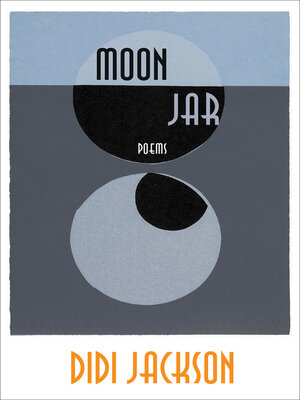
Sign up to save your library
With an OverDrive account, you can save your favorite libraries for at-a-glance information about availability. Find out more about OverDrive accounts.
Find this title in Libby, the library reading app by OverDrive.



Search for a digital library with this title
Title found at these libraries:
| Library Name | Distance |
|---|---|
| Loading... |
This debut poetry collection "gives poignant testimony to the sorrow, rage, and piercing clarity of grief"—an Alice James Book Award finalist (Tracy K. Smith).
In her intimately compelling debut collection Moon Jar, Didi Jackson explores the life-altering and heart-rending loss of her husband to suicide. While grief never fully subsides, Jackson allows herself to rediscover love as she contends with the haunting grip of human trauma. With precision and grace, these affirmative poems exhibit an admirable devotion to self-healing that is metamorphic and cathartic.
Turning to biblical narratives as well as seminal works of art by the likes of Hildegard of Bingen, Pablo Picasso, Sappho, Mark Rothko, Kazimir Malevich, Hieronymus Bosch, and Frédéric Chopin, Jackson orchestrates a tableau of conversations around human suffering, the natural world, and impermanence. And like the Korean porcelain moon jar, these poems mark and celebrate the imperfection of existence.
In her intimately compelling debut collection Moon Jar, Didi Jackson explores the life-altering and heart-rending loss of her husband to suicide. While grief never fully subsides, Jackson allows herself to rediscover love as she contends with the haunting grip of human trauma. With precision and grace, these affirmative poems exhibit an admirable devotion to self-healing that is metamorphic and cathartic.
Turning to biblical narratives as well as seminal works of art by the likes of Hildegard of Bingen, Pablo Picasso, Sappho, Mark Rothko, Kazimir Malevich, Hieronymus Bosch, and Frédéric Chopin, Jackson orchestrates a tableau of conversations around human suffering, the natural world, and impermanence. And like the Korean porcelain moon jar, these poems mark and celebrate the imperfection of existence.







